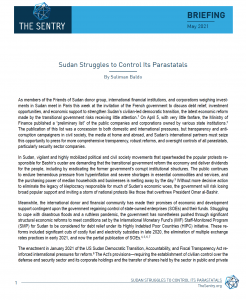 Read the full briefing
Read the full briefing
> اقرأ ملخص وتوصيات المقال بالعربية
As members of the Friends of Sudan donor group, international financial institutions, and corporations weighing investments in Sudan meet in Paris this week at the invitation of the French government to discuss debt relief, investment opportunities, and economic support to strengthen Sudan’s civilian-led democratic transition, the latest economic reform made by the transitional government risks receiving little attention.* On April 5, with very little fanfare, the Ministry of Finance published a “preliminary list” of the public companies and corporations owned by various state institutions.* The publication of this list was a concession to both domestic and international pressures, but transparency and anticorruption campaigners in civil society, the media at home and abroad, and Sudan’s international partners must seize this opportunity to press for more comprehensive transparency, robust reforms, and oversight controls of all parastatals, particularly security sector companies.
In Sudan, vigilant and highly mobilized political and civil society movements that spearheaded the popular protests responsible for Bashir’s ouster are demanding that the transitional government reform the economy and deliver dividends for the people, including by eradicating the former government’s corrupt institutional structures. The public continues to endure tremendous pressure from hyperinflation and severe shortages in essential commodities and services, and the purchasing power of median households and businesses is melting away by the day.* Without more decisive action to eliminate the legacy of kleptocracy responsible for much of Sudan’s economic woes, the government will risk losing broad popular support and inviting a storm of national protests like those that overthrew President Omar al-Bashir.
Meanwhile, the international donor and financial community has made their promises of economic and development support contingent upon the government regaining control of state-owned enterprises (SOEs) and their funds. Struggling to cope with disastrous floods and a ruthless pandemic, the government has nonetheless pushed through significant structural economic reforms to meet conditions set by the International Monetary Fund’s (IMF) Staff-Monitored Program (SMP) for Sudan to be considered for debt relief under its Highly Indebted Poor Countries (HIPC) initiative. These reforms included significant cuts of costly fuel and electricity subsidies in late 2020, the elimination of multiple exchange rates practices in early 2021, and now the partial publication of SOEs.* * * *
The enactment in January 2021 of the US Sudan Democratic Transition, Accountability, and Fiscal Transparency Act reinforced international pressures for reform.* The Act’s provisions—requiring the establishment of civilian control over the defense and security sector and its corporate holdings and the transfer of shares held by the sector in public and private enterprises—appear to have factored into the military’s decision to divest from its companies engaged in non-defense related activities.*
The government’s publication of a preliminary list of parastatals was slow in coming—almost eighteen months since the civilian-led cabinet took office in September 2019. The delay was caused by the internal resistance of the most cash-rich parastatals, which continue to oppose the government’s efforts to bring them under its control. In particular, parastatals registered to the Sudan Armed Forces (SAF), the General Intelligence Services (GIS), and the national police have registered the strongest opposition to what they consider a challenge to the financial autonomy of their institutions.
Such resistance was to be expected. Bashir’s regime made parastatals a cornerstone of an elaborate kleptocratic system designed to economically empower regime insiders and to fund the ruling party and the radical Islamist movement for which the party fronted—all to the detriment of the national economy.* Following the fall of Bashir, the civilian and military partners in the transition set up the Empowerment Elimination, Anti-Corruption, and Funds Recovery Committee in November 2019.* * By its first anniversary, the anti-corruption body reported recovering 20 million square meters of residential land, more than a million acres of agricultural lands, 50 companies, 60 organizations, and sizable cash seizures for the Ministry of Finance and other government bodies.*
While some elements directly linked to the Bashir regime are being dismantled, others continue to thrive in the transition, namely powerful security sector and civilian parastatals. Parastatals are one of the main reasons that Sudan’s government controls only 18% of the resources generated by government agencies and their economic activities, as Prime Minister Hamdok suggested in an August 2020 national address.* The government can change this by showing more resolve in enforcing existing laws for the protection of public money and by sanctioning those who abuse it. In particular, the government should institute a Treasury Single Account, thoroughly reform the Commercial Registry, and uphold the oversight of the Ministry of Finance and the National Audit Chamber over public funds. Parastatals should open their books to the Ministry of Finance and submit to its control all revenue from services and business transactions. Sudan’s international partners should continue supporting the Sudanese authorities’ efforts to ensure the compliance of all parastatals with fiscal transparency requirements.
Read the full briefing >

